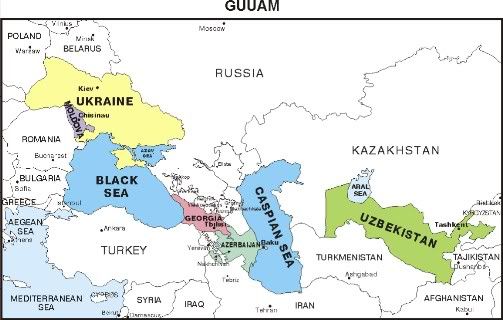Then, Islam Karimov took his fateful step this year: "On May 5, 2005, Uzbekistan finally gave an official notice of withdrawal from the organization to the Moldovan presidency" ("GUUAM," Wikipedia). The corporate media in the United States maintained studied silence on the fact that "the Andijan riots ensued just a week after Karimov's decision to quit GUUAM" (Sergei Blagov, "An Iron Fist, Without the Glove," 17 May 2004), refusing to connect the dots.
But now the plot thickens -- here comes talk of a meeting between George W. Bush and Mohammed Salih (Salai Madaminov). . . .
A test of the extent of Bush's commitment to this hands-on approach could come in the next two weeks when Mohammed Salih, chairman of the Democratic Erk Party of Uzbekistan, a leading opponent of the Central Asian government, visits Washington. The Bush administration has been torn over how forcefully to respond to the recent massacre of hundreds of protesters in the Uzbek city of Andijan, with the State Department pushing for a firm repudiation and the Pentagon resisting for fear of jeopardizing its base there.That compels Karimov, finally, to resolve to talk openly about the elephant in the room:
Salih, who received a U.S. visa on Monday and will be in the United States from June 27 to June 30, hopes to meet with senior Bush administration officials and to describe the situation in Uzbekistan, where President Islam Karimov has banned genuine opposition parties and independent media and imprisoned thousands of government critics.
"We have calls out to everybody, and, right now, we don't have a yes or no from anybody," said Frank Howard, a media liaison for Erk. A high-level meeting, he added, "has not only symbolic importance, it has potential real importance."
Karimov's government has curtailed U.S. military flights at the Uzbek base in response to the Bush administration criticism, but Rice promised rights groups yesterday not to ease up on calls for an international investigation of the Andijan massacre.
"I told her that the State Department approach was absolutely right, but they're being completely undercut by the Pentagon, and the Uzbeks are playing them," said Tom Malinowski, the Washington director for Human Rights Watch. "She looked me in the eye and said, 'We will not let Karimov play us.'" (Peter Baker and Glenn Kessler, "Bush Meets Dissidents in Campaign for Rights," Washington Post, 15 Jun. 2005, A1)
"The events in Andizhan were organized by the scriptwriters and directors of the 'colored' revolutions," Uzbek President Islam Karimov said on Tuesday.As Reuters hints, Karimov probably crossed the Rubicon:
"It doesn't matter what we call these revolutions -- tulip or orange ones. I would call them simply operations. These operations are being conducted on CIS territory most flagrantly and without any punishment," Karimov said while meeting with Russian President Vladimir Putin at Novo-Ogaryovo near Moscow.
In Karimov's view, recent events "might have been speeded up by Uzbekistan's more independent policy and the rejection of some proposals." (Interfax, "Andizhan Plotted by Authors of Colored Revolutions -- Karimov," 28 Jun. 2005)
Karimov had earlier blamed his radical opponents for stoking Andizhan revolt and denied suggestions that it was akin to peaceful revolutions, which had changed governments in ex-Soviet Ukraine and Georgia in the past two years.Putin makes a big show of backing up Karimov:
But Karimov, who sees himself as a U.S. ally in the war against terror, had so far carefully avoided making any links between the West and Andizhan violence. (Oleg Shchedrov, "Uzbekistan Points Finger at West over May Violence," Reuters, 28 Jun. 2005)
Vowing all help to Tashkent to fight terrorism, President Vladimir Putin has said that armed Afghan militants were concentrating near the borders with Uzbekistan and infiltrating into the Central Asian countries.The question is whether Putin will stand by Karimov, when push comes to shove.
During talks with Uzbek President Islam Karimov, at the Presidential residence at Novo-Ogaryovo, outside Moscow, Putin said that Russian special services had information about the concentration of militants in Afghanistan before the Andizhan events, in Uzbekistan, on May 13.
"We confirm the information that militants infiltrated from bases in Afghanistan. They were concentrating on border territories. Our secret services confirm that it is true," Putin said emphatically. (Dadan Upadhyay, "Armed Militants from Afghanistan Infiltrating C. Asia," Indian Express, 30 Jun. 2005)
Sanjar G. Umarov, a pro-Washington oligarch who heads up "Sunshine Uzbekistan" (an opposition group of neoliberal business leaders), is visiting Moscow at the same time as Karimov:
By the invitation from Russian business and political circles Mr. S.G. Umarov the Chairman of coalition for National Unity “Sunshine Uzbekistan” will visit Moscow beginning June 27 to July 3.At a minimum, Moscow is hedging its bets.
Considering interests of Russia in different sectors including the Oil and Gas, cotton, mining, as well as in communication and transportation infrastructure of Central Asia, meetings are expected on the different level, anticipated topics will be participation of Russian organizations in peaceful resolution, from the political crises in which Uzbekistan has fallen following Andijan tragedy. (Sunshine Uzbekistan, Press Release, 25 Jun. 2005)
Then, there is a question of the relation between Umarov and Gulnara Karimova -- Karimov's daughter and one of the most powerful Uzbek industrialists -- which remains murky. Is it an alliance, an antagonism, or a mixture of both (Gulnoza Saidazimova, "Uzbekistan: Sanjar Umarov -- An Oligarch Angling for The Presidency?" Radio Free Europe/Radio Liberty, 2 June 2005; Dmitry Kamtsev, "Professor Aleksei Malashenko: Gulnara Karimova Is One of Preferable Candidates for Successor to the President of Uzbekistan," Ferghana.ru, 9 Jun. 2005; and Daniil Kislov/Ferghana.Ru, "The US Will Listen to the Uzbek Opposition Leader While Putin Is Meeting with Karimov," Journal of Turkish Weekly, 28 Jun. 2005)?
The Great Game in the Caspian Sea Region is stranger than a potboiler, but the intricate intrigue with many subplots will soon come to a boil, so stay tuned.





No comments:
Post a Comment